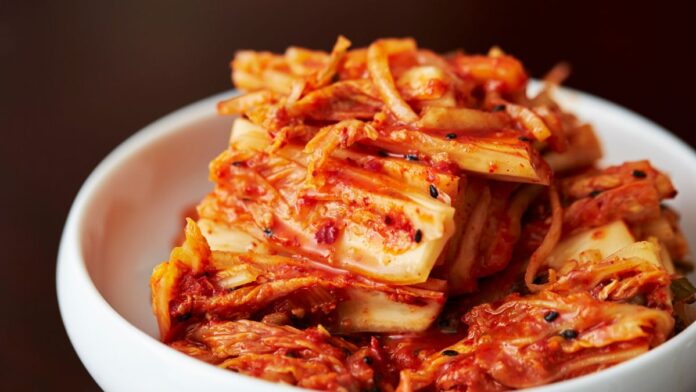Discover if it’s safe to eat kimchi during pregnancy. Learn about the potential benefits and risks, and get expert advice on including kimchi in your diet while expecting. Find answers to the question, “Can you eat kimchi while pregnant? Is kimchi safe for pregnancy?” with mucusplug.net!
Can you eat kimchi while pregnant? Is it safe?
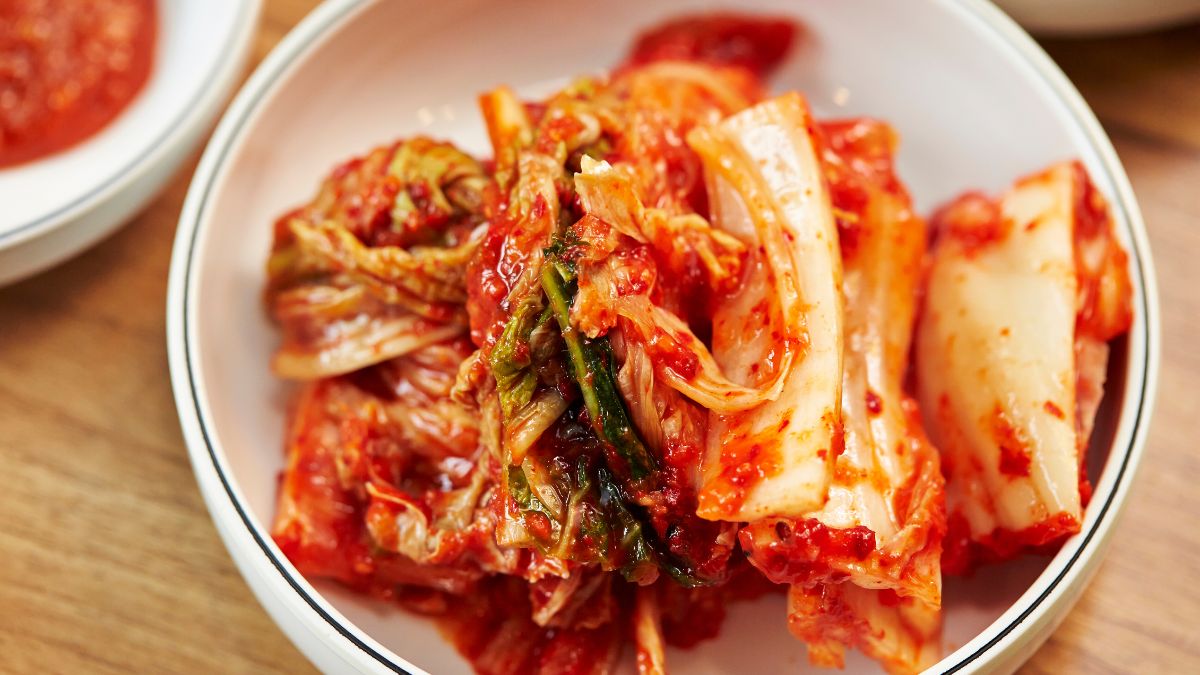
Is it safe to consume kimchi during pregnancy? Absolutely, indulging in kimchi is generally considered safe for both the expectant mother and the developing baby, provided it is consumed in moderation and precautions are taken to avoid any potential contamination with harmful bacteria.
Kimchi, a traditional Korean fermented dish primarily made from napa cabbage and radishes, is rich in probiotics and nutrients, making it a potentially beneficial addition to a pregnant woman’s diet. However, it’s crucial to ensure that the kimchi is prepared and stored hygienically to minimize the risk of foodborne illnesses.
Throughout history, countless generations of parents have included kimchi in their diets during pregnancy without adverse effects, contributing to the belief that it can be enjoyed safely. As always, it is advisable for pregnant individuals to consult with their healthcare provider for personalized advice based on their individual health circumstances.
>Related post: Lancome products safe for pregnancy
Benefits of kimchi during pregnancy
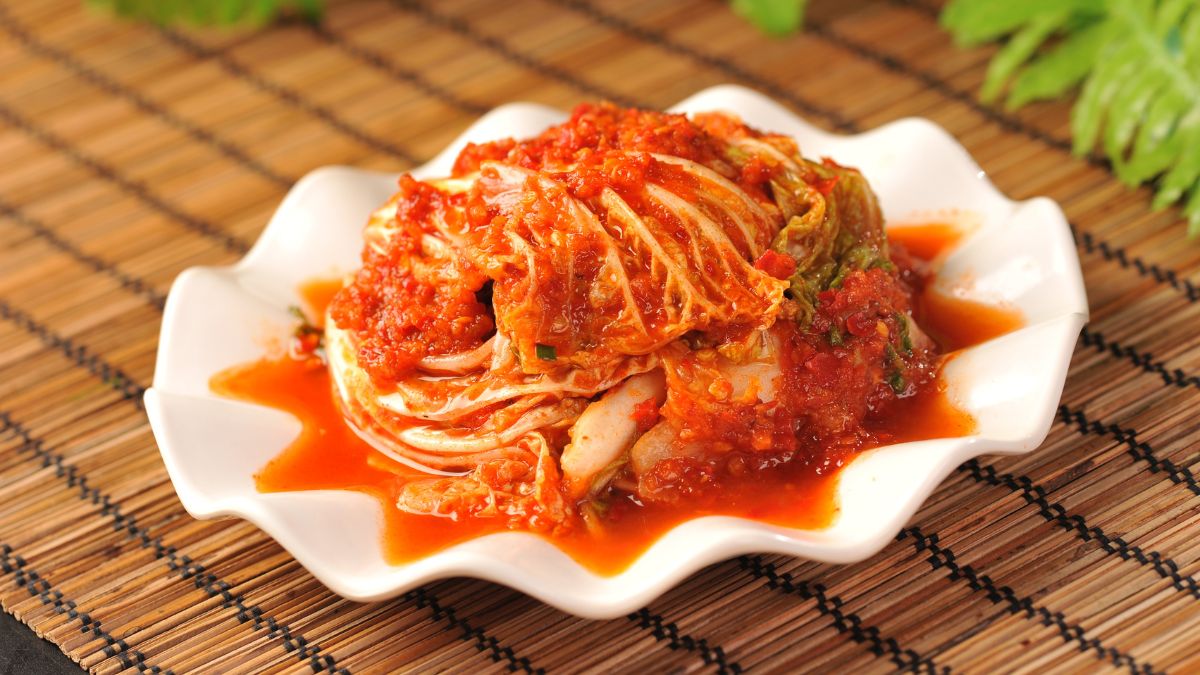
If you weren’t a big kimchi eater before, its health benefits during pregnancy might make you a new fan. “The traditional fermentation process of making kimchi suppresses harmful bacteria and allows beneficial bacteria to thrive,” explains Moon, noting that research has long supported the vast positives of kimchi, including probiotic, antioxidant, anti-aging, cholesterol reducing, digestive health, anti-cancer, and anti-bacterial properties.
Immune health
The immune system is suppressed slightly during pregnancy to protect the fetus, but the body does its best balancing act to keep the parent protected against infection. The “good” bacteria in fermented foods, like kimchi, actually give our immunity a helpful boost.
“Anything that we can do to assist the body in being able to defend itself against any kind of pathogens, the better,” says Erlich. “Kimchi and other fermented vegetables also have their own positives: there’s the health benefits of the vegetable itself, plus all that healthy bacteria created during fermentation.”
Optimal digestion
Erlich also touts kimchi’s overall assistance in keeping digestion regular and helping with nutrient assimilation. “The healthier the microbiome of the gut, the easier it is for the body to absorb nutrients from foods,” she says.
If you’re gobbling up the good stuff—we’re talking whole foods like vegetables, fruits, and other vitamin-rich items—you might as well reap their benefits to the fullest extent.
Preventing yeast infections
The idea of a yeast infection at any time in life is unpleasant. But a yeast infection while pregnant sounds downright cruel. Fermented foods, like kimchi, contain probiotics that may be helpful in preventing the overgrowth of candida. Superti F, De Seta F. Warding off recurrent yeast and bacterial vaginal infections: lactoferrin and lactobacilli.
The bacteria that causes yeast infections of gut bacteria, called Candida Albicans, can become overgrown if we eat too much sugar or take medications,” explains Erlich. “Fermented vegetables, taking probiotics, and eating things like yogurt or kefir help to restore the balance in the gut so that the Candida is not the dominant strain anymore, which is one way to help control yeast infections.
>Related post: Is Olipop safe for pregnancy to drink?
Are fermented foods safe during pregnancy?
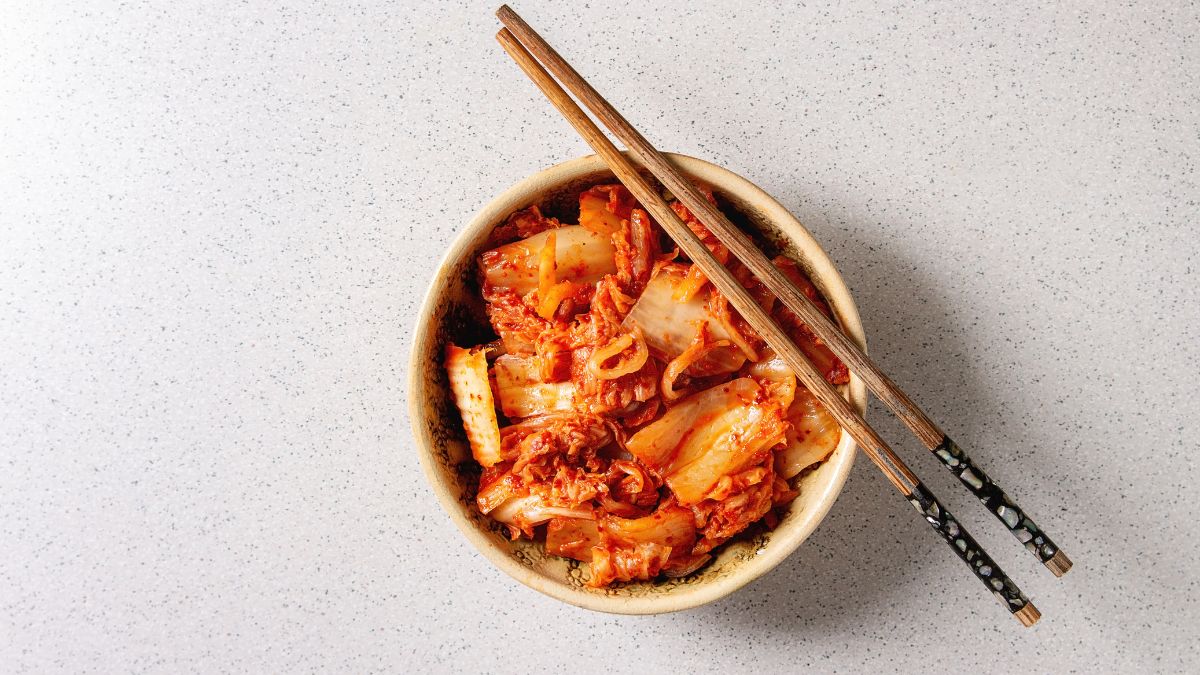
During pregnancy, it’s essential to carefully consider the safety of consuming fermented foods. While fermented foods can offer various health benefits, it’s crucial to be selective to ensure the well-being of both the mother and the developing baby. Some fermented foods may pose potential risks during pregnancy.
It is advisable to avoid mold-based ferments, as molds can produce mycotoxins that may be harmful. Additionally, caution is recommended with honey ferments due to the potential presence of botulism spores, which can be harmful to infants. Fermented meats, eggs, and raw cheese should also be approached with care, as they may carry an increased risk of contamination.
If fermented foods were not a regular part of your diet before pregnancy, it’s advisable to introduce them gradually and in small amounts. This approach allows you to monitor how your body responds to these foods and whether there are any adverse reactions. Starting with smaller portions helps you gauge tolerance and assess any potential digestive issues, ensuring a smoother transition into incorporating fermented foods into your diet during this crucial period.
As always, it is essential to consult with your healthcare provider before making significant changes to your diet during pregnancy. They can offer personalized advice based on your individual health circumstances and guide you on making informed choices to support a healthy pregnancy.
>Related post: Belly painting during pregnancy: Is it safe? Best belly painting ideas?
Who should not eat kimchi?
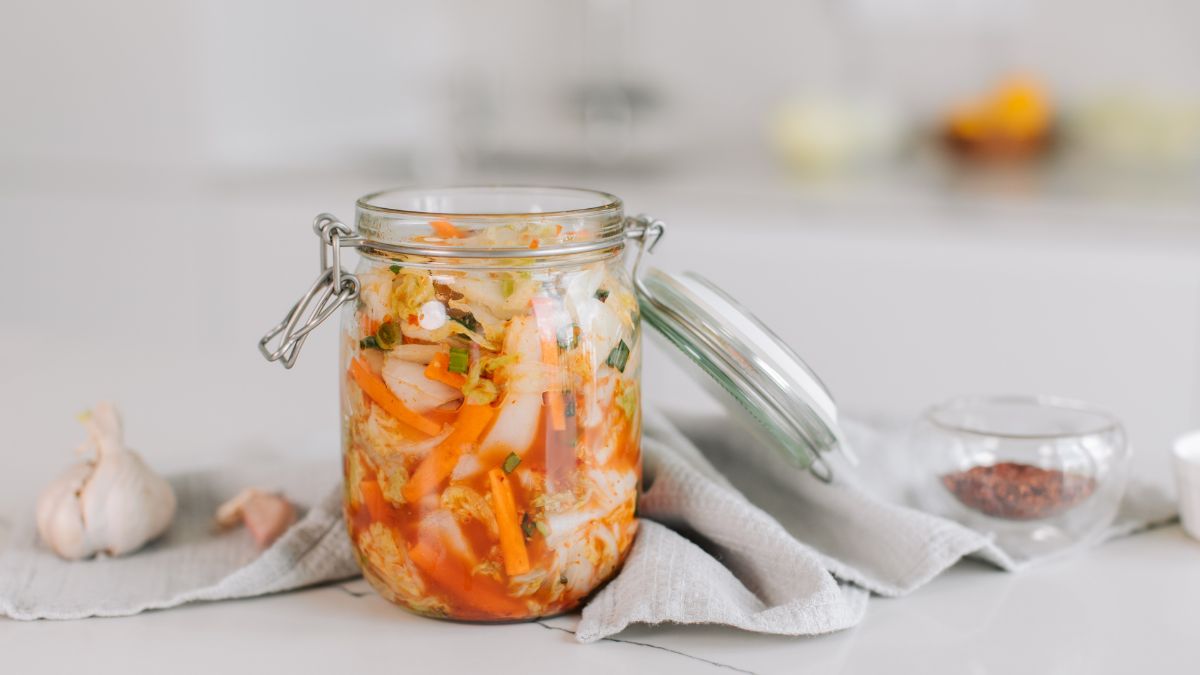
Individuals with compromised immune systems, such as those undergoing chemotherapy, organ transplant recipients, or individuals with HIV/AIDS, should exercise caution when considering the consumption of kimchi. While the bacteria responsible for fermenting kimchi are generally safe for most people, improper preparation or storage of kimchi can lead to a risk of food poisoning, particularly for those with weakened immune systems.
In these cases, the body may struggle to combat harmful bacteria or pathogens that could potentially thrive during the fermentation process. Therefore, it is advisable for individuals with compromised immune systems to consult with their healthcare providers before including kimchi or other fermented foods in their diet, ensuring that necessary precautions are taken to minimize the risk of foodborne illnesses.
By seeking guidance from healthcare professionals, individuals can make informed decisions regarding their dietary choices and reduce the likelihood of adverse health effects associated with improperly prepared or stored kimchi.
Is it OK to eat kimchi everyday?
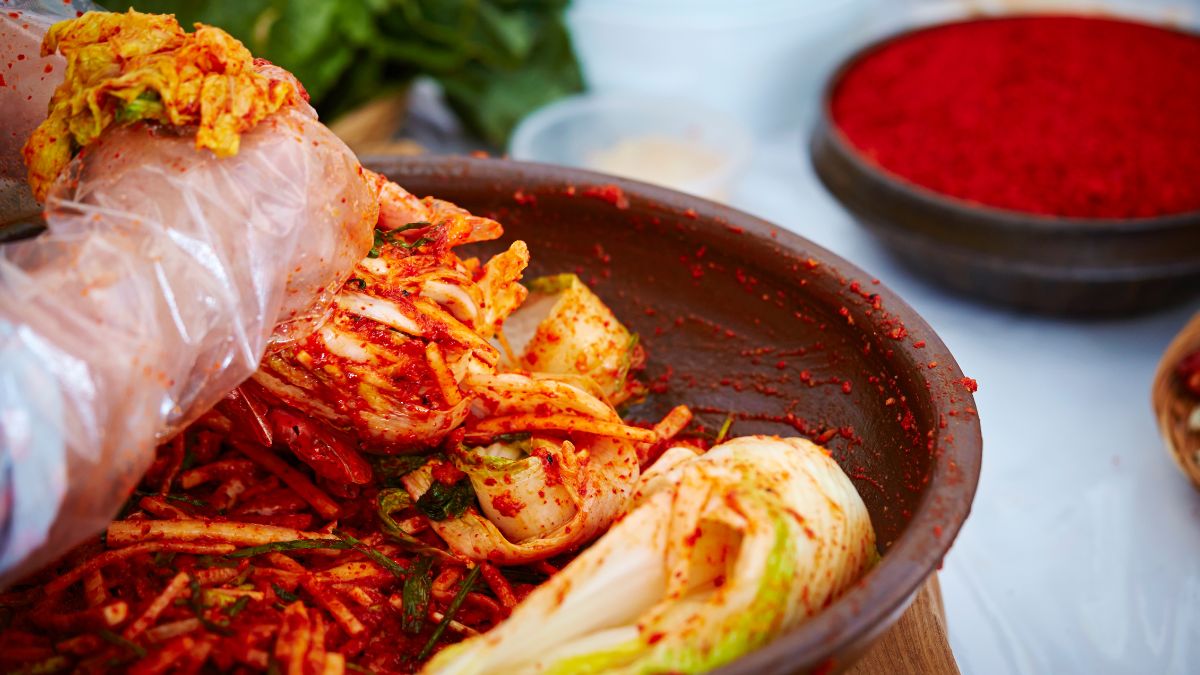
Is it advisable to incorporate kimchi into your daily diet? Consuming kimchi on a regular basis can indeed offer numerous health benefits owing to its rich nutritional profile. This traditional Korean dish is packed with vitamins A and C, as well as essential minerals like calcium and iron. Moreover, the fermentation process involved in kimchi production results in the formation of probiotics, which promote a healthy gut microbiome and can enhance digestive health.
‘However, it’s essential to be mindful of potential drawbacks, particularly for individuals with specific health concerns. Those who suffer from irritable bowel syndrome (IBS) may need to exercise caution, as the spicy and fermented nature of kimchi could exacerbate digestive symptoms. Additionally, individuals at risk of high blood pressure, stroke, or heart disease should be cautious due to kimchi’s relatively high sodium content and the presence of garlic, which may affect certain health conditions negatively.
As with any dietary choice, moderation and individual health considerations play a crucial role in determining whether making kimchi a daily part of your diet is appropriate for you. Consulting with a healthcare professional can provide personalized guidance based on your specific health needs and conditions.
>Related post: Can sperm affect a pregnancy test?
How much kimchi a day is safe?

Determining the safe daily consumption of kimchi requires considering various factors such as individual health conditions, tolerance to fermented foods, and dietary preferences. For those unfamiliar with incorporating kimchi into their diet, nutritionist Garcia suggests a gradual approach to avoid any potential digestive discomfort. Starting with a modest intake of two to three tablespoons per day is recommended as an initial introduction.
This allows the digestive system to adapt to the probiotics and unique flavors of kimchi. Over time, as the body becomes accustomed, the quantity can be gradually increased to ¼ cup and eventually up to ½ cup per day. This progressive adjustment enables individuals to assess their own comfort level and observe how their body responds to the fermented delicacy.
It’s important to be mindful of personal health considerations and consult with a healthcare professional if there are any concerns about incorporating kimchi into the diet, especially for those with specific dietary restrictions or medical conditions.
Does kimchi affect hormones?
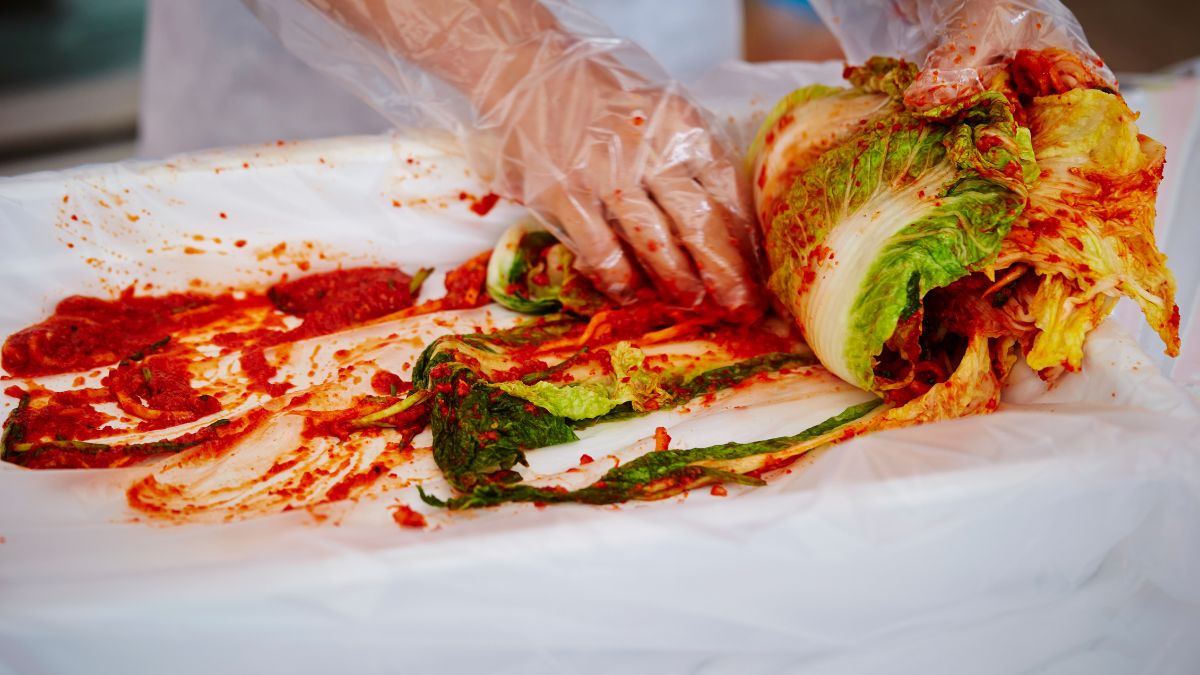
The consumption of kimchi, a traditional Korean fermented dish, has been studied in relation to its potential impact on hormonal balance, particularly in the context of promoting overall well-being. Kimchi belongs to a category of fermented foods that includes other probiotic-rich options such as yogurt, miso, tempeh, and sauerkraut.
The fermentation process involved in kimchi production results in the development of beneficial bacteria, which are known as probiotics. When incorporated into the diet, these probiotics play a crucial role in enhancing gut health. A healthy gut is associated with a reduction in inflammation and is believed to contribute to the optimization of hormonal levels within the body.
By fostering a balanced and thriving gut microbiome, kimchi, along with other fermented foods, may indirectly influence the endocrine system, potentially contributing to improved hormonal regulation. This link between fermented foods, gut health, and hormonal balance underscores the interconnected nature of dietary choices and overall physiological well-being.
>Related post: Sex after IVF positive pregnancy test: Facts you should know
Can you eat kimchi while pregnant? Is kimchi safe for pregnancy? In conclusion, enjoying kimchi during pregnancy can be safe when consumed in moderation. Its probiotic-rich nature may even offer health benefits. Consult with your healthcare provider for personalized advice, ensuring a balanced and nourishing diet throughout your pregnancy journey.

